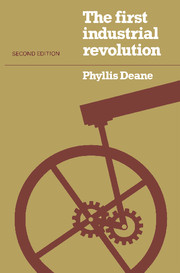Book contents
- Frontmatter
- Contents
- Preface to the first edition
- Preface to the second edition
- 1 The starting-point
- 2 The demographic revolution
- 3 The agricultural revolution
- 4 The commercial revolution
- 5 The transport revolution
- 6 The cotton industry
- 7 The iron industry
- 8 The sources of innovation
- 9 The role of labour
- 10 The role of capital
- 11 The role of the banks
- 12 The adoption of free trade
- 13 The role of government
- 14 Economic growth and economic cycles
- 15 Standards of living
- 16 The achievement
- Guide to further reading
- Subject index
- Index of authors cited
- Frontmatter
- Contents
- Preface to the first edition
- Preface to the second edition
- 1 The starting-point
- 2 The demographic revolution
- 3 The agricultural revolution
- 4 The commercial revolution
- 5 The transport revolution
- 6 The cotton industry
- 7 The iron industry
- 8 The sources of innovation
- 9 The role of labour
- 10 The role of capital
- 11 The role of the banks
- 12 The adoption of free trade
- 13 The role of government
- 14 Economic growth and economic cycles
- 15 Standards of living
- 16 The achievement
- Guide to further reading
- Subject index
- Index of authors cited
Summary
Economic growth and economic change involve an expansion of the flow of goods and services produced in the economy and change in its composition. One way of assessing the achievements of an industrial revolution therefore is to measure its consequences in terms of their effects on standards of living. It might be expected that the process of industrial revolution, bringing with it, as it does, a great lowering in costs of production both in agriculture and industry, a perceptible reduction in the amount of human effort required to produce a given unit of output and a consequent increase in the flow of goods and services available for consumption would automatically involve a corresponding rise in the standard of living of the working man. Whether or not it does have these consequences, however, depends on a variety of circumstances, not least of which is the rate of population growth. It is rapidly becoming apparent in today's newly developing countries, for example, that even assuming a fairly brisk rate of technological progress in industry it is only too easy for the number of mouths to be fed to multiply more rapidly than productivity per person in active employment, and hence for the average standard of consumption to fall. If the rising population is due, as it frequently is, to a higher birth rate or a lower infant mortality rate it brings with it a larger dependent population and a smaller proportion of the total population in active employment.
- Type
- Chapter
- Information
- The First Industrial Revolution , pp. 255 - 271Publisher: Cambridge University PressPrint publication year: 1980



